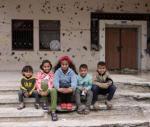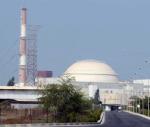You are here
EU vows $290m for Armenia amid tensions with Russia
By AFP - Apr 07,2024 - Last updated at Apr 07,2024

From left to right: Armenian Prime Minister Nikol Pashinyan, EU Commission President Ursula von der Leyen, US Secretary of State Antony Blinken and European Union Foreign Policy chief Josep Borrell, hold a joint press conference in Brussels on Friday (AFP photo)
BRUSSELS, Belgium — The European Union on Friday pledged a 270-million-euro ($290-million) financial package for Armenia, seeking along with Washington to boost ties with Yerevan as its relations with Russia crumble.
The announcement came after talks in Brussels aimed at ramping up cooperation between Armenian Prime Minister Nikol Pashinyan, European Commission President Ursula von der Leyen and US Secretary of State Antony Blinken.
Armenia, a former Soviet republic in the Caucasus, is looking to solidify economic support from the West as it edges away from traditional ally Russia. Armenia is angry with Moscow for failing to stop neighbouring Azerbaijan from recapturing territory in recent years.
Baku criticised the Brussels meeting and accused Armenia of opening fire at the Caucasus arch-foe neighbours’ volatile border.
Von der Leyen said the four-year “resilience and growth” package of financial grants for Armenia showed the EU stood “shoulder to shoulder” with Yerevan.
“Europe and Armenia share a long and common history and the time has come to write now a new chapter,” she said.
Pashinyan said Friday’s meeting in Brussels was proof of his country’s “expanding partnership” with the EU and United States. “I believe that our shared vision of a democratic, peaceful and prosperous future will continue to serve as the backbone and the guiding star of our mutually trusted relations,” he said.
Blinken said the US was also bolstering its economic support for Yerevan to $65 million this year to aid efforts to make Armenia “a strong, independent nation at peace with its neighbours”.
“We have to harness this moment of choice for the Armenian people and for its leaders,” he said.
Armenia has drawn Russia’s ire by criticising its role as a regional security guarantor and even floating the idea of applying to join the EU.
‘Geopolitical confrontation’
Yerevan has a long-standing alliance with Moscow.
But it was infuriated when the Kremlin -- consumed by the Ukraine war and annoyed by Pashinyan’s overtures to the West -- failed to stop Azerbaijan seize the Nagorno-Karabakh region from Armenian separatists last year.
Since then, Pashinyan and Azerbaijani President Ilham Aliyev have voiced hope for a comprehensive peace agreement between their countries.
But the two sides on Tuesday traded accusations that the other had opened fire across their shared border, renewing fears of conflict.
Ahead of the talks in Brussels, Blinken and von der Leyen called Aliyev on Wednesday to try to ease tensions.
But Aliyev on Friday criticised the summit in Brussels as “directed against Azerbaijan” and working against cooperation in the region.
“High-ranking US and EU officials attempted to convince us that the meeting in Brussels is not directed against Azerbaijan, but it creates yet another source of tensions in the South Caucasus,” he said.
In the latest flare-up in tensions on Friday evening, the arch-foe Caucasus neighbours traded accusations of opening fire along their volatile shared border.
Azerbaijan’s defence said in a statement that Armenian military “using small arms, subjected to fire the Azerbaijan Army positions” stationed near the countries’ shared border.
Armenian defence ministry, for its part, dismissed the claim as “disinformation”. It said “units of the Azerbaijani armed forces opened fire from small arms toward Armenian combat positions” deployed at the frontier district of Gergharkunik.
Pashinyan said at the Brussels meeting that he remained “committed to the normalisation of relations with Azerbaijan”.
But Turkey, Azerbaijan’s main backer, warned that Armenia’s talks with the US and EU “undermine the neutral approach that should be the basis for the solution of the complex problems of the region”.
“This initiative, which excludes Azerbaijan, will pave the way for the South Caucasus to become an area of geopolitical confrontation, rather than serving peace,” Turkey’s foreign ministry said.
Related Articles
BRUSSELS — Armenia and Azerbaijan's leaders met Sunday for talks in Brussels amid heightened tensions on the tense border between the two co
YEREVAN — Armenia said on Tuesday that nearly 50 of its soldiers had been killed in the worst clashes with Azerbaijan since their war
YEREVAN — Armenia accused Azerbaijan on Tuesday of injuring one of its soldiers in a shootout, the latest incident between the Caucasus coun















